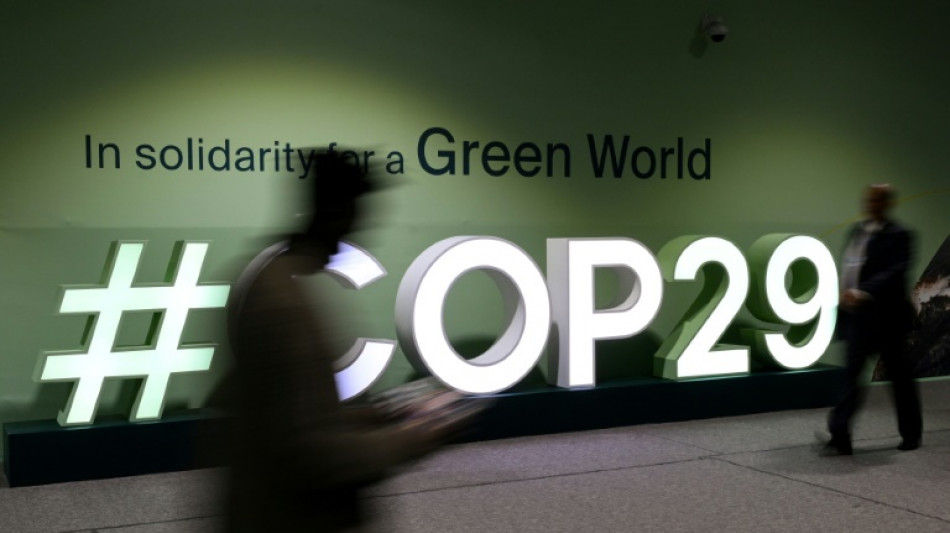
-
 Premier League chief fears Club World Cup's impact on Man City and Chelsea
Premier League chief fears Club World Cup's impact on Man City and Chelsea
-
US mulls new restrictions on Chinese drones

-
 Rosita Missoni of Italy's eponymous fashion house dies age 93
Rosita Missoni of Italy's eponymous fashion house dies age 93
-
27 sub-Saharan African migrants die off Tunisia in shipwrecks

-
 UK grime star Stormzy banned from driving for nine months
UK grime star Stormzy banned from driving for nine months
-
Neil Young dumps Glastonbury alleging 'BBC control'
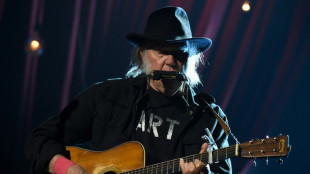
-
 Swiatek battles back to take Poland into United Cup semis
Swiatek battles back to take Poland into United Cup semis
-
Electric cars took 89% of Norway market in 2024
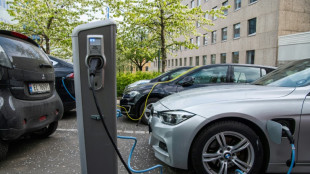
-
 Rival South Korea camps face off as president holds out
Rival South Korea camps face off as president holds out
-
French downhill ace Sarrazin out of intensive care

-
 Djokovic cruises past Monfils as rising stars impress in Brisbane
Djokovic cruises past Monfils as rising stars impress in Brisbane
-
Montenegro mourns after gunman kills 12

-
 Sales surge in 2024 for Chinese EV giant BYD
Sales surge in 2024 for Chinese EV giant BYD
-
Agnes Keleti, world's oldest Olympic champion, dies at 103

-
 Andreeva, Mpetshi Perricard showcase Australian Open potential
Andreeva, Mpetshi Perricard showcase Australian Open potential
-
Afghan refugees suffer 'like prisoners' in Pakistan crackdown

-
 Coach tight-lipped on whether Rohit will play in final Australia Test
Coach tight-lipped on whether Rohit will play in final Australia Test
-
Blooming hard: Taiwan's persimmon growers struggle
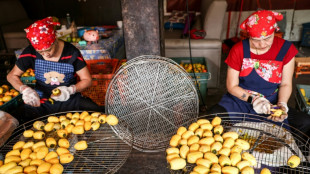
-
 South Korea's impeached president resists arrest over martial law bid
South Korea's impeached president resists arrest over martial law bid
-
Knicks roll to ninth straight NBA win, Ivey hurt in Pistons victory

-
 'Numb' New Orleans grapples with horror of deadly truck attack
'Numb' New Orleans grapples with horror of deadly truck attack
-
Asia stocks begin year on cautious note

-
 FBI probes 'terrorist' links in New Orleans truck-ramming that killed 15
FBI probes 'terrorist' links in New Orleans truck-ramming that killed 15
-
2024 was China's hottest year on record: weather agency
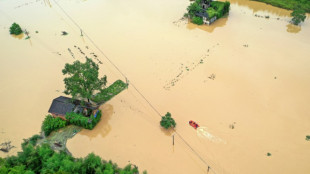
-
 Perera smashes 46-ball ton as Sri Lanka pile up 218-5 in 3rd NZ T20
Perera smashes 46-ball ton as Sri Lanka pile up 218-5 in 3rd NZ T20
-
South Korea police raid Muan airport over Jeju Air crash that killed 179

-
 South Korea's Yoon resists arrest over martial law bid
South Korea's Yoon resists arrest over martial law bid
-
Sainz set to step out of comfort zone to defend Dakar Rally title

-
 New Year's fireworks accidents kill five in Germany
New Year's fireworks accidents kill five in Germany
-
'I'm Still Here': an ode to Brazil resistance
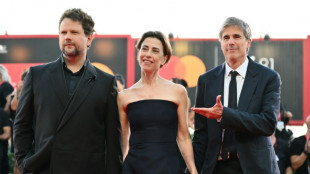
-
 New Orleans attack suspect was US-born army veteran
New Orleans attack suspect was US-born army veteran
-
Australia axe Marsh, call-up Webster for fifth India Test

-
 Jets quarterback Rodgers ponders NFL future ahead of season finale
Jets quarterback Rodgers ponders NFL future ahead of season finale
-
Eagles' Barkley likely to sit out season finale, ending rushing record bid

-
 Syria FM hopes first foreign visit to Saudi opens 'new, bright page'
Syria FM hopes first foreign visit to Saudi opens 'new, bright page'
-
At least 10 dead in Montenegro restaurant shooting: minister

-
 Arteta reveals Arsenal hit by virus before vital win at Brentford
Arteta reveals Arsenal hit by virus before vital win at Brentford
-
Palestinian Authority suspends Al Jazeera broadcasts
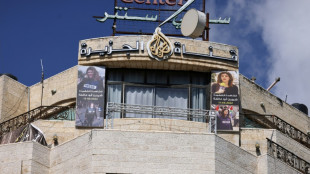
-
 Arsenal close gap on Liverpool as Jesus stars again
Arsenal close gap on Liverpool as Jesus stars again
-
Witnesses describe 'war zone' left in wake of New Orleans attack

-
 Cosmetic surgery aficionado Jocelyne Wildenstein dies aged 79: partner
Cosmetic surgery aficionado Jocelyne Wildenstein dies aged 79: partner
-
Tschofenig takes overall Four Hills lead after second leg win

-
 10 killed in New Year's truck ramming in New Orleans, dozens hurt
10 killed in New Year's truck ramming in New Orleans, dozens hurt
-
Leeds and Burnley held to draws as Windass hits Wednesday wonder strike

-
 New Orleans truck attack: what we know so far
New Orleans truck attack: what we know so far
-
Saudi executes at least 338 people in 2024: AFP tally

-
 Migrants crossing Channel to UK in 2024 soar by 25 percent
Migrants crossing Channel to UK in 2024 soar by 25 percent
-
Power restored to most of Puerto Rico: utility

-
 Seko Fofana joins Rennes after Saudi Arabia stint
Seko Fofana joins Rennes after Saudi Arabia stint
-
Brazil's Amazon saw highest number of fires in 17 years: agency


Climate-threatened nations stage protest at COP29 over contentious deal
The world's most climate-imperilled nations stormed out of consultations in protest at the deadlocked UN COP29 conference Saturday, as simmering tensions over a hard-fought finance deal erupted into the open.
Diplomats from small island nations threatened by rising seas and impoverished African states angrily filed out of a meeting with summit hosts Azerbaijan over a final deal being thrashed out in a Baku sports stadium.
"We've just walked out. We came here to this COP for a fair deal. We feel that we haven't been heard," said Cedric Schuster, the Samoan chairman of the Alliance of Small Island States (AOSIS).
An unpublished version of the final text circulating in Baku, and seen by AFP, proposes that rich nations raise to $300 billion a year by 2035 their commitment to poorer countries to fight climate change.
COP29 hosts Azerbaijan intended to put a final draft before 198 nations for adoption or rejection on Saturday evening, a full day after the marathon summit officially ended.
But, in a statement, AOSIS said it had "removed" itself from the climate finance discussions, demanding an "inclusive" process.
"If this cannot be the case, it becomes very difficult for us to continue our involvement here at COP29," it said.
Sierra Leone's climate minister Jiwoh Abdulai, whose country is among the world's poorest, said the draft was "effectively a suicide pact for the rest of the world".
An earlier offer from rich nations of $250 billion was slammed as offensively low by developing countries, who have demanded much higher sums to build resilience against climate change and cut emissions.
UK Energy Secretary Ed Miliband said the revised offer of $300 billion was "a significant scaling up" of the existing pledge by developed nations, which also count the United States, European Union and Japan among their ranks.
At sunset, a final text still proved elusive, as harried diplomats ran to-and-fro in the stadium near the Caspian Sea searching for common ground.
"Hopefully this is the storm before the calm," said US climate envoy John Podesta in the corridors as somebody shouted "shame" in his direction.
Earlier, the EU's climate commissioner Wopke Hoekstra said negotiators were not out of the woods yet.
"We're doing everything we can on each of the axes to build bridges and to make this into a success. But it is iffy whether we will succeed," he said.
- 'Ripped off' -
Ali Mohamed, the Kenyan chair of the African Group of Negotiators, told AFP: "No deal is better than a bad deal."
"What we are not up for is going backwards or standing still," he said. "We might as well just have stayed at home then."
The revised offer from rich countries came with conditions in other parts of the broader climate deal under discussion in Azerbaijan.
The EU in particular wants an annual review on global efforts to phase out fossil fuels, which are the main drivers of global warming.
This has run into opposition from Saudi Arabia, which has sought to water down a landmark pledge to transition away from oil, gas and coal made at COP28 last year.
"We will not allow the most vulnerable, especially the small island states, to be ripped off by the new, few rich fossil fuel emitters," said German Foreign Minister Annalena Baerbock.
Wealthy nations counter that it is politically unrealistic to expect more in direct government funding.
The US earlier this month elected former president Donald Trump, a sceptic of both climate change and foreign assistance, and a number of other Western countries have seen right-wing backlashes against the green agenda.
A coalition of more than 300 activist groups accused historic polluters most responsible for climate change of skirting their obligation, and urged developing nations to stand firm.
The draft deal posits a larger overall target of $1.3 trillion per year to cope with rising temperatures and disasters, but most would come from private sources.
Even $300 billion would be a step up from the $100 billion now provided by wealthy nations under a commitment set to expire.
A group of developing countries had demanded at least $500 billion, with some saying that increases were less than met the eye due to inflation.
Experts commissioned by the United Nations to assess the needs of developing countries said $250 billion was "too low" and by 2035 rich nations should be providing at least $390 billion.
The US and EU have wanted newly wealthy emerging economies like China -- the world's largest emitter -- to chip in.
China, which remains classified as a developing nation under the UN framework, provides climate assistance but wants to keep doing so on its own voluntary terms.
M.Gameiro--PC
